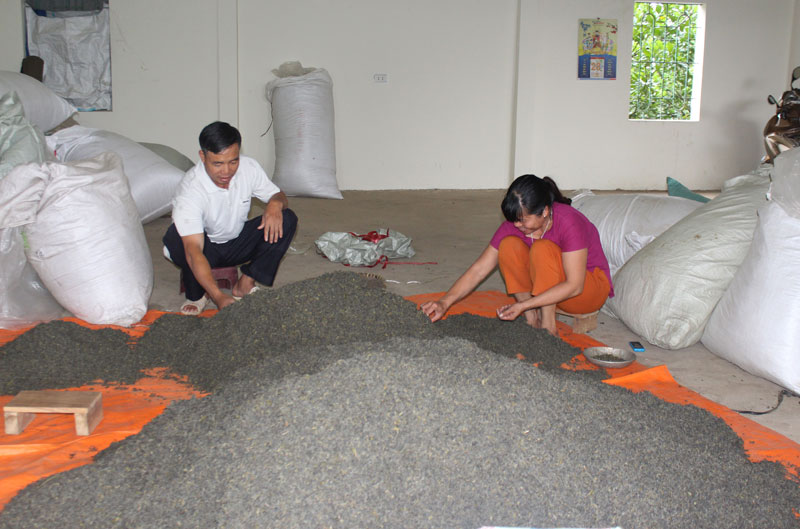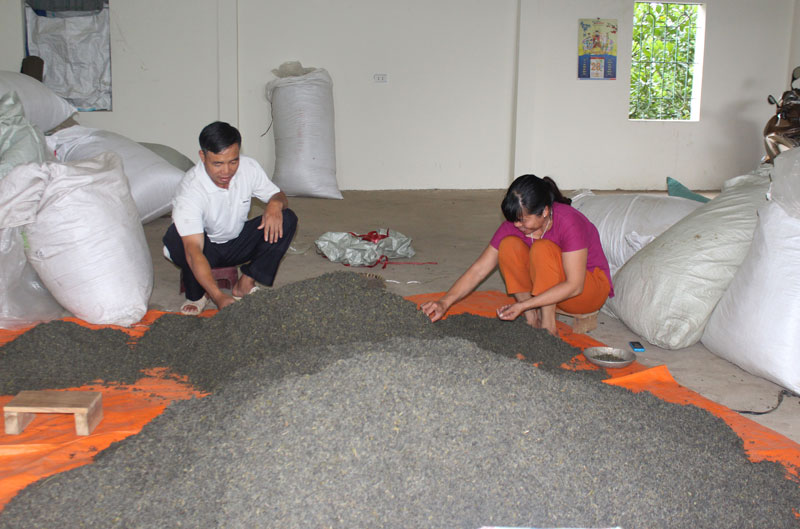
(HBO) - Along with the expansion of citrus fruit area, tea plant is still recognized by the people of Tan Thanh Commune (Luong Son) as a key crop, contributing to the stability of their lives. At present, the whole commune maintains a total area of 55 hectares of tea plants, of which fresh tea leaves are 50.5 hectares, the area of old tea leaves is 4.5 hectares. The area of tea plants is mainly concentrated in My Tan and Tan Thanh villages.
Tea is an industrial plant that has a product lifespan of over 20 years
with high production efficiency. Therefore, in recent years, although the
locality has been doing garden renovation, they still keep the area of tea
plants. In addition, to implement the project on the development of raw
material tea areas of the province, Tan Thanh was identified as one of the key
communes of Luong Son district to build Lac Thuy - Luong Son tea area, forming
the oriented production area of raw materials of about 900 hectares.
Taking us to visit the tea material area of My Tan village, Ms. Pham Thi
Nguyet, the Secretary of the village Party Communist Branch confirmed: tea is
still the key crop of My Tan village. There are 170 households but 120
households out of them plant teas with the total area of 21.6 hectares.
Currently, there are 3 tea varieties in tea plantations, that are Phu Ho tea,
shan tea, mid-land tea. These are the traditional tea varieties, which have
been planted in the village since 1968. These varieties are suitable for
weather conditions and soil here. To be convenient for the processing, about
85% of tea growing households in the village have equipped tea drying machines.
The advantages of tea plants are easy to care, the local people have experience
in growing and taking care of tea, so the yield can reach at about 10 tons / hectare. The output of My Tan tea
is quite stable with the prices of fresh tea leaves at 6,000 VND / kg; Type 1
tea is priced at 90,000 VND / kg, Type 2 tea is priced at 70,000 VND / kg.
Thanks to tea trees, the average income per capita of the village in 2018 is 22
million VND, the rate of poor households is reduced to 2%.

85% of households in My Tan village, Tan Thanh commune (Luong Son) invested
in tea drying machine to ensure the processing of tea products.
At present, in order to raise the value of tea quality, Tan Thanh commune
is taking care of investing in improving quality and output, paying attention
to changing the method of tea production and processing tea from traditional
one to VietGAP standardized production.
According to data from the Hoa Binh Provincial Party Committee, the industrial production index for the first six months of 2025 is estimated to have increased by 20% compared to the same period last year. This marks the highest year-on-year growth rate for this period since 2020.
In the first six months of 2025, Hoa Binh province’s export turnover was estimated at 1.145 billion USD, marking an 18.11% increase compared to the same period in 2024. Import turnover was estimated at $ 804 million, a 17.15% increase, which helped the province maintain a positive trade balance.
The lives of the ethnic minority farmers in Tan Lac district have gradually improved thanks to the new directions in agricultural production. This is a testament to the collective strength fostered through the professional associations and groups implemented by various levels of the district’s Farmers’ Union.
With the motto the "product quality comes first,” after nearly one year of establishment and operation, Muong village’s Clean Food Agricultural and Commercial Cooperative, located in Cau Hamlet, Hung Son Commune (Kim Boi district), has launched reputable, high-quality agricultural products to the market that are well-received by consumers. The products such as Muong village’s pork sausage, salt-cured chicken, and salt-cured pork hocks have gradually carved out a place in the market and they are on the path to obtaining the OCOP certification.
In the past, the phrase "bumper harvest, rock-bottom prices" was a familiar refrain for Vietnamese farmers engaged in fragmented, small-scale agriculture. But today, a new spirit is emerging across rural areas of Hoa Binh province - one of collaboration, organisation, and collective economic models that provide a stable foundation for production.
Maintaining growing area codes and packing facility codes in accordance with regulations is a mandatory requirement for agricultural products to be eligible for export. Recently, the Department of Agriculture and Environment of Hoa Binh province has intensified technical supervision of designated farming areas and packing facilities to safeguard the "green passport" that enables its products to access international markets.



